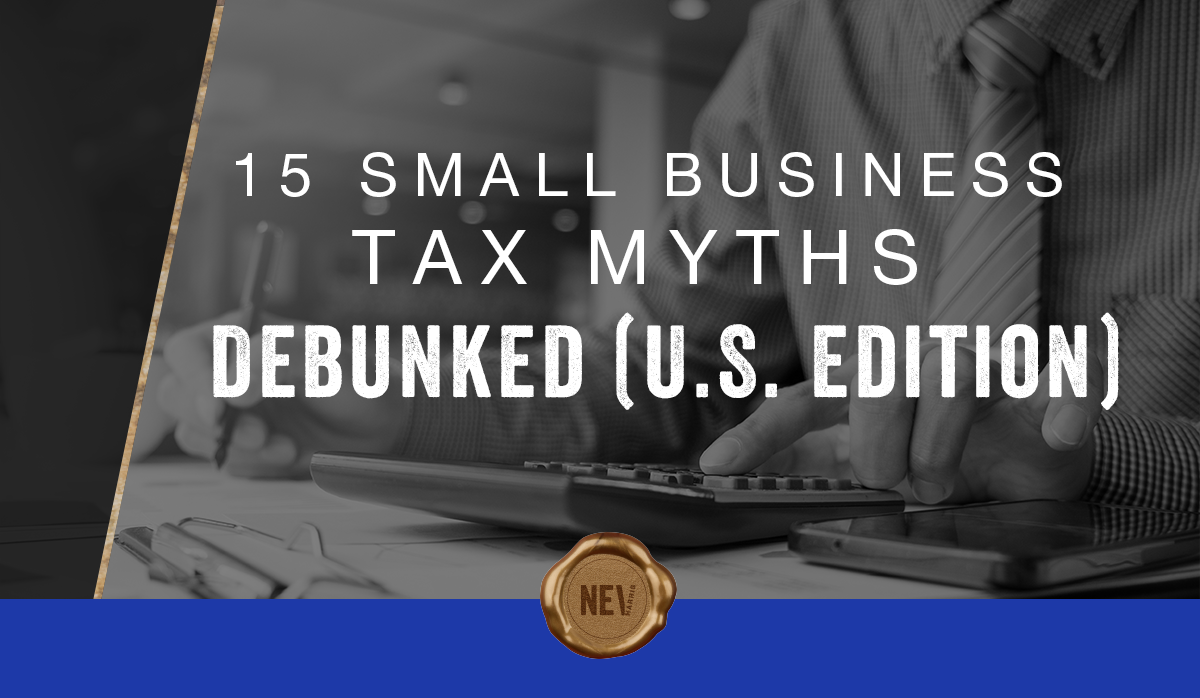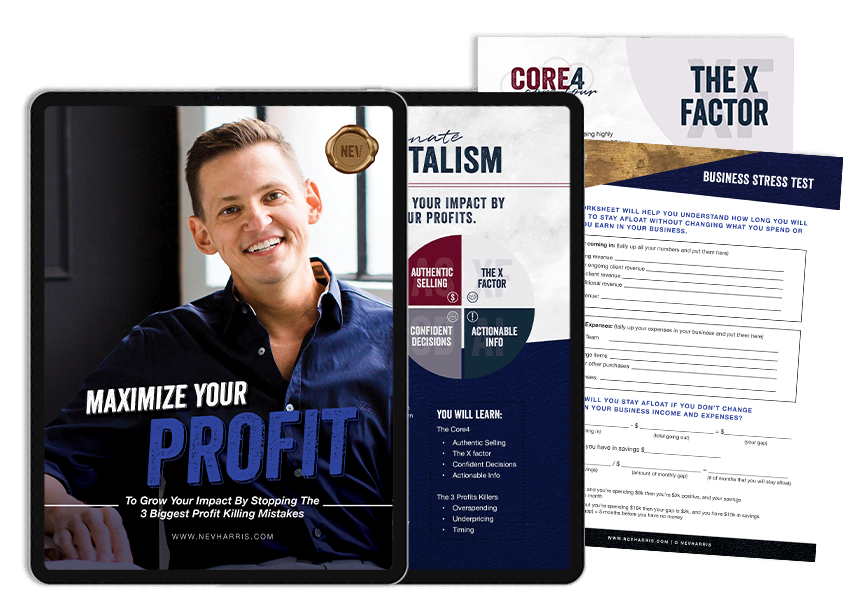15 Small Business Tax Myths Debunked (U.S. Edition)


When you think about all the freedoms that small agency ownership allows for, it’s hard to imagine making a living any other way. The problem? The challenge of navigating tax time (plus a bunch of tax myths) is enough to send you running for a safe retreat.
While starting a business may have helped you escape the boredom, stress, or toxicity you experienced when you were employed, owning your own business is no cake-walk either. Especially when it comes to tax management.
It doesn’t matter if you’re employed or self-employed. Everyone owes taxes to the government. As a small agency owner in the United States, do you understand what exactly that entails? If you’re unsure, then keep reading as we uncover and debunk the 15 most common small business tax myths
Myth #1: Taxes are due annually.
While the official preparation and filing of taxes is due by April 15 every year, self-employed individuals and agency owners are required to make quarterly payments for both federal and state taxes.
Estimated tax payments are due in full on:
- April 15 – for January, February, and March income (plus, any money owed on your annual return)
- June 17 – for April and May fb pg CTA See all of our tax tips ● September 16 – for June, July, and August
- January 20 – for September, October, November, and December
Myth #2: Taxes are the same whether you’re employed or self employed.
If you’re a freelancer or small agency owner, you actually owe more to the government than your employed counterparts do.
Companies take care of extracting taxes from their employees’ paychecks and submitting them to the government. At the same time, they share the burden of those taxes with their employees, so employees end up having less to pay.
You, on the other hand, must pay the full amount of social security and Medicare taxes to the government.
Myth #3: You don’t owe taxes for any side hustles.
For entrepreneurs trying to set up multiple streams of revenue, it’s not uncommon to be working on a side hustle while running your main business. That said, your side hustle cannot fly under the radar come tax season. If you earn more than $12,000 every year, then you have to pay taxes on all income.
Myth #4: You don’t need to worry about taxes until the deadline.
If you want to make your life easier, then you should have a year-round tax management strategy. By making it a regular habit, you won’t have to scramble to make payments on an upcoming deadline nor will you have to stress about what taxes are doing to your profit margins.
By factoring taxes into your over financial strategy, you’ll never lose sight of them as you make big decisions about how much you charge clients or what you spend money on in your business.
Myth #5: If your clients don’t send a 1099, you don’t have to report the income.
If you earn more than $600 from a client, and they’re based in the United States, they owe you a 1099-MISC form by January 31. However, even if your client fails to provide you with the form or to report the income to the IRS, you are still responsible for paying taxes on it.
Myth #6: If you work with international clients, you have to pay twice the amount of taxes.
Working with clients outside the United States and working in another country are two different things.
If you live in the U.S., tax payments are owed to the U.S. government regardless of where your clients are located.
However, if you live in another country, you could end up owing them taxes as well. To avoid double taxation, U.S. citizens can utilize certain provisions that reduce that burden. They are:
- Foreign tax credit and deduction
- Foreign-earned income exclusion
- Foreign housing cost exclusion
Myth #7: You should spend as much money as possible at year’s end to get the biggest tax break.
Many agency owners get to the end of the year and scramble to spend as much income as possible on their business. The thought behind this is, “I’ll spend as much of it as I can, so there’s barely any taxes left to pay.”
While that may be true, it’s important to consider whether or not these expenses are absolutely necessary. If you’re purchasing conference tickets, new software, or other things for work that are nice-to-have but not a necessity, is that really going to help your business right now?
What’s more, is it worth the debt you’ll accumulate just to avoid paying more in taxes?
Tax Myth #8: Any money you spend for your business is deductible.
“To be deductible, a business expense must be both ordinary and necessary. An ordinary expense is one that is common and accepted in your trade or business. A necessary expense is one that is helpful and appropriate for your trade or business.”
A good example of this is a gym membership. While an employer might provide you with free or discounted health and wellness services, this isn’t an ordinary or necessary expense as someone who’s self-employed. But that computer you use every day to build websites? That is definitely shiny obj CTA deductible.
Be careful with expenses that straddle the line between personal and professional, too. For instance, if you were to book a conference in the middle of a long weekend or vacation, you can expense the costs directly related to the conference, but nothing else.
Myth #9: You can write off your home office as an expense.
Home-based agency owners used to be fearful that writing off the expense of a home office was an instant ticket to a tax audit. Thanks to the rise of the location-independent worker, though, this is no longer cause for suspicion.
That said, you’re only allowed to deduct the home office expense if you have a dedicated space for work. It can’t be the square footage around your sofa or the stool you work from in the dining room. It must be an actual workspace where 100% of the activities done there are related to your business.
Myth #10: You don’t need to keep receipts.
Even if you’re not purchasing equipment or supplies from the nearby office retailer, you still need to keep a copy of your receipts (physical and digital).
Part of the reason for this is because it makes it easier to prepare your taxes at the end of the year . Another reason is because, if you get audited, they’re going to ask for proof that you paid for the item and that it went towards your business.
If you use accounting software like QuickBooks or FreshBooks, it will help you keep tabs on this important documentation.
Myth #11: You’re more likely to be audited as a small agency owner than an employee.
It’s not the fact that you’re a agency owner that sends you to the top of the IRS’s list of people to audit. It’s more that your tax submission is full of red flags. Things like excessive business spending, overpaying of quarterly taxes, and high and unnecessary deductions could trigger an audit.
Myth #12: If you’re not a sole proprietor, then you don’t owe self-employment tax.
Regardless of your business’s status, you will owe self-employment tax.
For those whose businesses are a sole proprietorship or partnership, 100% of your income is eligible for the self-employment tax (that’s social security and Medicare).
For those whose businesses are incorporated, you’re only responsible for paying self-employment tax on the salary you receive from the business’s earnings.
Myth #13: You can use the tax filing extension to buy yourself time to make payments.
As April 15 approaches, you’ll likely receive reminders from your accountant, bookkeeping software, or the IRS that your taxes are due, but with the caveat that you can file for an extension if needed.
But that extension doesn’t apply to the payment. If you owe the government taxes by April 15 ( or any of the quarterly deadlines), you have to make those payments on time. The filing extension only buys you time to file your tax paperwork.
Myth #14: You don’t need a bookkeeping software when you start.
You might feel like things are quiet enough when your business is new that you don’t need to spend money on bookkeeping software just yet. But tax management is not a simple thing and the more you do to organize your finances throughout the year, the easier it’ll be to pull everything together in the end.
Myth #15: Your accountant is 100% responsible for your tax management.
It’s important to understand what you’re actually getting when you hire an accountant.
For starters, they will help you prepare and file your paperwork. However, it’s still your responsibility to collect receipts, report earnings, and provide them with the correct information. If you’re audited as a result of misinformation, your accountant is not liable. You are.
Secondly, you haven’t hired them to serve in an advisory capacity. They’re there to handle your taxes. If your business is growing and taxes are becoming more complicated and unwieldy, it’s best to hire a tax or financial expert to help.
Join our Facebook Group Think Tank for Agency Owners and Freelancers to get more tax tips!
Don’t Let These Small Business Tax Myths Get in Your Way
Of all the stumbling blocks that could arise due to your finances, you don’t want mismanagement of your taxes to be the one to get in your way. Especially when the government is so clear on what exactly they need from you.
If you want to be more comfortable with and confident in managing your taxes, learn the truth about these tax myths now. Then, implement a strategy that enables you to put the right amount of money aside, make payments on time, and steer clear of the dreaded audit.


